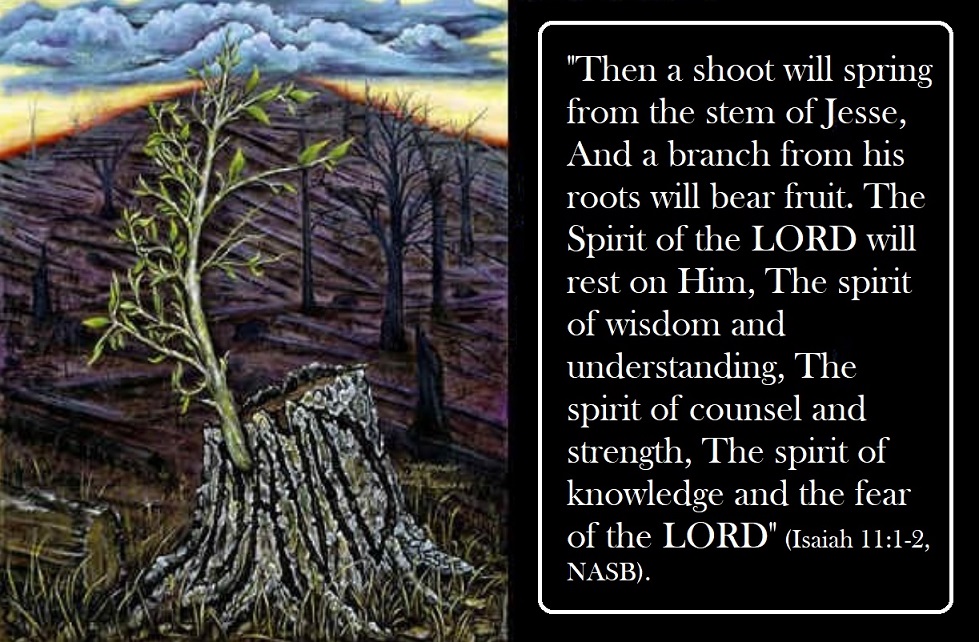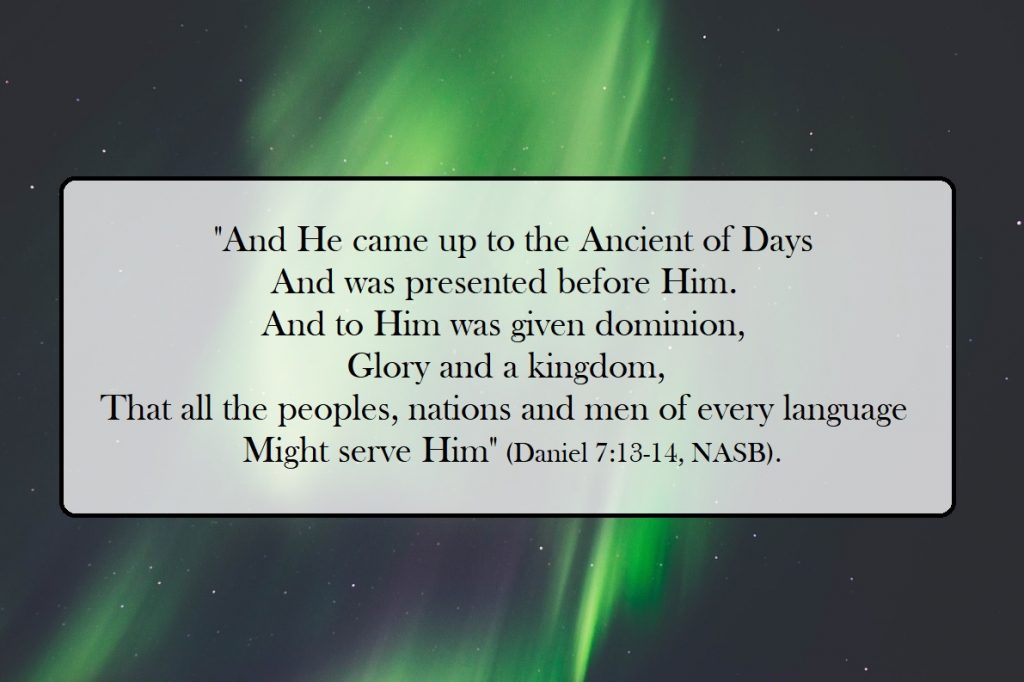“Go therefore and make disciples of all the nations…teaching them to observe all that I commanded you; and lo, I am with you always, even to the end of the age” (Matthew 28:19-20, NASB).
——————–
Contents:
1) Does It Really Matter to God? (Jefferson David Tant)
2) News & Notes
——————–

-1-
Does It Really Matter to God?
Jefferson David Tant
In discussing religious differences, varied attitudes are expressed when it is pointed out that some particular practice or doctrine of a church conflicts with what the Bible says. One of the more common responses when a contradiction is seen is “Well, I don’t think it matters with God.” This writer believes that this attitude is dangerous, and wholly unacceptable to God. Please consider what God’s Word reveals about such matters.
The very first sin involved Adam and Eve eating some forbidden fruit. From the human viewpoint, what could possibly be so serious about eating a little piece of fruit? Was Eve convinced by Satan that it really didn’t matter to God? Whatever her thoughts were, the result was disastrous. God really did care.
In time, the world became so wicked that God decided to remove evil from the earth. Noah found favor in God’s sight, so God instructed Noah to build a large boat, giving him specific instructions concerning its construction. He gave Noah the dimensions of the ark, and also told him to make it out of gopher wood. “Make thee an ark of gopher wood: rooms shalt thou make in the ark, and shalt pitch it within and without with pitch” (Gen. 6:14). Suppose that Noah had decided to add some oak trim in his living quarters because Mrs. Noah wanted a little variety. Would that have mattered to God? After all, what difference could a little wood possibly make? Or what if he decided to make the ark 10 meters longer. Would that have been acceptable?
In offering worship to God, does it matter to him what we do? I have heard various comments when discussing acceptable worship. Some say, “I really like it…” about some practice. Then the question is whether our worship is meant to please us or to please God? If God is the object of our worship, can we know how to please him apart from revelation? Do we set the standard, or do we allow God to do so? When we insist on doing what pleases us, thinking that it will surely please God, we must remember the words of the prophet Isaiah. “For my thoughts are not your thoughts, neither are your ways my ways, saith Jehovah. For as the heavens are higher than the earth, so are my ways higher than your ways, and my thoughts than your thoughts” (Isa. 55:8-9).
Others say, “I don’t think it matters to God.” Long ago, there were two priests who evidently thought this. Nadab and Abihu were offering incense to the Lord, and had to obtain fire to burn it. There was a problem, shown in Leviticus 10:1-3: “And Nadab and Abihu, the sons of Aaron, took each of them his censer, and put fire therein, and laid incense thereon, and offered strange fire before Jehovah, which he had not commanded them. And there came fire from before Jehovah, and devoured them; and they died before Jehovah. Then Moses said unto Aaron, This is what Jehovah spake, saying, I will be sanctified in them that come nigh me, and before all the people I will be glorified. And Aaron held his peace.” Evidently Nadab and Abihu thought “Fire is fire, and one fire burns as well as another. It doesn’t matter to God where we get the fire.” But it did matter. God had told them to take the fire from another place, very likely from the bronze altar. It made a difference to God. Notice also that it does not say that God told them not to take fire from another place. The text simply says that they took fire “which he had not commanded them.” When people justify a practice because “God didn’t say not to do it,” they mistake silence for consent. By the same reasoning, one could feel free to steal my car, justifying the deed by claiming, “But you didn’t tell me not to do it.” Nadab and Abihu certainly learned the hard way that it does make a difference! Remember, what Nadab and Abihu must have thought was not the same thing that God thought.
As Moses led the people Israel out of Egypt and through their wilderness wandering, more than once he was impatient with their lack of faith. They grumbled often, forgetting how God had provided for them time and again: When they complained of thirst, God told Moses to strike a rock that was in their presence, and water would come forth. Moses did so, and the people were blessed with an abundance of water (Ex. 17:6). Sometime later, the people again complained that they were about to die, and they blamed Moses for taking them away from Egypt. God then gave instruction to Moses concerning obtaining water. “And Jehovah spoke unto Moses, saying, Take the rod and assemble the congregation, thou, and Aaron thy brother, and speak ye unto the rock before their eyes, that it give forth its water; and thou shalt bring forth to them water out of the rock; so thou shalt give the congregation and their cattle drink.” Notice what God told Moses. Previously he had instructed Moses to strike the rock with his rod. This time he tells Moses to speak to the rock. So what did Moses do? “And Moses took the rod from before Jehovah, as he commanded him. And Moses and Aaron gathered the assembly together before the rock, and he said unto them, Hear now, ye rebels; shall we bring you forth water out of this rock? And Moses lifted up his hand, and smote the rock with his rod twice: and water came forth abundantly, and the congregation drank, and their cattle.” Some might think, “So what’s the big deal? Moses got water, didn’t he? It really didn’t matter to God whether Moses struck the rock, or spoke to it.” But as we read on in the text, we learn that it did matter to God. “And Jehovah said unto Moses and Aaron, Because ye believed not in me, to sanctify me in the eyes of the children of Israel, therefore ye shall not bring this assembly into the land which I have given them” (Numbers 20:7-12). Moses came to understand that when God said something, his words were to be respected.
Many years later, David was returning the ark of the covenant to its rightful place after it had been captured by the Philistines. “And they set the ark of God upon a new cart, and brought it out of the house of Abinadab that was in the hill: and Uzzah and Ahio, the sons of Abinadab, drove the new cart. And they brought it out of the house of Abinadab, which was in the hill, with the ark of God: and Ahio went before the ark… And when they came to the threshing floor of Nacon, Uzzah put forth his hand to the ark of God, and took hold of it, for the oxen stumbled. And the anger of Jehovah was kindled against Uzzah; and God smote him there for his error; and there he died by the ark of God” (II Sam. 6:3-6). Why did Uzzah die? Certainly his heart was right, for his only desire was to save the ark from damage if it fell to the ground. Who could fault that?
In truth, there were two problems. First, God had given instructions about moving the ark. The ark had rings on its sides, and poles were to be put through the rings so the Kohathites could carry the ark in that manner. They had no authority, i.e., no permission to carry the ark on a cart. In the second place, it was forbidden for anyone to touch the ark (Numbers 4:5-15). Who would have ever thought it would make any difference as to whether the ark was carried on a cart or by the priests? After all, the object was to bring it back to where it belonged. And surely Uzzah had a good heart when he put his hand to the ark to steady it. But his presumptuousness brought death. As one commentary phrased it, “Here we see the danger it is to follow good intentions, or to do anything in God’s service without his express word” (Geneva Bible Notes).
There was a Gentile prophet named Balaam, who had been asked by the Moabite king, Balak, to come and curse Israel. Balak offered a reward of great riches. But Balaam knew better, and his response to Balak is something we should all learn. “And Balaam answered and said unto the servants of Balak, If Balak would give me his house full of silver and gold, I cannot go beyond the word of Jehovah my God, to do less or more” (Num. 22:18). Balaam certainly stated a principle that we should all remember. We are not at liberty to go beyond what God has said, no matter how good our intentions may be.
In II Kings is the story of a Syrian army general named Naaman. He had leprosy, and was told by his Jewish servant girl that he could be cured in Israel. Naaman ended up at the door of the prophet Elisha, who sent word to him to go dip in the Jordan River seven times and he would be healed. At first Naaman thought this was entirely stupid, and went away in a rage. But a servant prevailed upon him. Naaman changed his mind and did as the prophet instructed. When he came up the seventh time, his skin was like that of a little child. There are three things that Naaman could have changed in this matter. He could have gone to another river; he could have dipped either more or fewer than the seven times, or he could have just poured a cup of water on his head rather than dip in the river. Do you think he would have been cured of his leprosy if he had just dipped five times? Or if he had taken a cup and poured water on his head? Surely not.
In considering these illustrations from the Bible, we can clearly see that when God says something, he means what he says, and men were not free to do anything differently, thinking that “it really didn’t matter to God, anyway.” There are many such examples that we could cite from God’s word.
These things being true, why is it that so many today are willing to disregard clear teaching from the Bible by saying, “I don’t think it matters to God”? Is there some explanation for this? When I talk to people about the subject of baptism, it is interesting to see the responses when it is pointed out that the Bible clearly teaches that baptism is an immersion in water (Rom. 6:3-5; Col. 2:12; Acts 8:38, etc.), and that in the original Greek language, the word baptizo is literally translated as “immerse, dip or plunge.” These things are pointed out, and so often the response is, “I don’t think the form of baptism matters to God.” Then I tell them of a church in Oklahoma that baptizes by sprinkling rose petals on the candidate. Well, they wouldn’t go that far. But if it doesn’t matter to God if we change the form of baptism, then why should it matter if we change the element? Question: How do we decide what matters to God? Does he give certain people a special revelation telling them to disregard one of his commands, while telling others to obey that same command in the way it is stated? If it doesn’t matter to God how we are baptized, why should it make any difference whether we are baptized or not? Granted, Jesus did say, “He that believeth and is baptized shall be saved” (Mark 16:16), but why should that make any difference?
We discuss the Lord’s Supper and how the Bible indicates that the practice of the early church was to partake every first day of the week. Church historians agree that this was the practice. Few churches follow this practice today. Some offer the communion once a month, once every three months, once a year, or even not at all. “But it doesn’t make any difference how often we take it, so long as we do it to honor God.” I tell them of some churches that do not observe the Lord’s Supper at all, such as the Salvation Army and the Christian Science Church. Does that make any difference to the Lord, who said “Do this in remembrance of me” (1 Cor. 11:24)? If we are free to change the frequency of observance, then are we free to eliminate it altogether? Or what about using Coke and potato chips for the Lord’s Supper? When I tell people about a Methodist Church that did that, they are often shocked. But if we are free to change what we want to change, then why can’t others change what they think doesn’t matter to the Lord?
If we are free to change what we think doesn’t matter to the Lord, then where is the stopping place? In truth, there is no place to stop, except to stop at what the Lord has said. God makes it clear that we are to respect what he has said, without additions, subtractions or alterations. This was true in the Old Testament. “The secret things belong unto Jehovah our God; but the things that are revealed belong unto us and to our children for ever, that we may do all the words of this law” (Deut. 29:29). “Every word of God is tried: He is a shield unto them that take refuge in him. Add thou not unto His words, Lest he reprove thee. And thou be found a liar” (Prov. 30:5-6).
God’s nature has not changed under the New Testament. His thoughts are still higher than ours, and all we can know about what pleases God is what he has revealed to us. We are instructed to “learn not to go beyond the things which are written” (I Cor. 4:6), and are warned about adding to or taking away. “I testify unto every man that heareth the words of the prophecy of this book, if any man shall add unto them, God shall add unto him the plagues which are written in this book: and if any man shall take away from the words of the book of this prophecy, God shall take away his part from the tree of life, and out of the holy city, which are written in this book” (Rev. 22:18 19). While those words were written specifically about the book of Revelation, there is no doubt that the principle applies to all that God has revealed to us.
Dear reader, why take a chance on eternity? Peter urges us “give the more diligence to make your calling and election sure” (I Peter 1:10). Why would anyone want to take a chance with the attitude that “it really doesn’t matter to God”? Nadab and Abihu, Moses and Uzzah will all testify that it does matter to God. Eternity is too long to ignore the lesson. And there are others who will also be there to give testimony. Christ spoke of them in Matthew 7:21-23: “Not every one that saith unto me, Lord, Lord, shall enter into the kingdom of heaven; but he that doeth the will of my Father who is in heaven. Many will say to me in that day, Lord, Lord, did we not prophesy by thy name, and by thy name cast out demons, and by thy name do many mighty works? And then will I profess unto them, I never knew you: depart from me, ye that work iniquity. ” Who are these people? They are religious people who believe in Christ and who evidently think they are serving him. But Christ says they are workers of “iniquity.” They were not murderers and thieves, as we might think the word iniquity might describe. The word literally means “without law,” thus referring to the fact that what they were doing was without authority from Christ. They presumed to do things for which they had no authority. That’s what Moses did. That’s what Nadab and Abihu did. That’s what people do today who practice things in religion for which there is no authority, thinking that it doesn’t matter to God, Don’t be one of them!
There are clear examples of this matter of doing what is not authorized, what is not spelled out in Scripture. In the Old Testament, when the exiles were returning from Babylonian captivity, they were seeking to put things in order with respect to their worship in the temple. Now the Law of Moses was explicit as to those who could serve as priests. They had to be of the tribe of Levi. This is recorded in Numbers 3:6; 18:2; Deut. 10:8, etc. Nowhere are we told that those from another tribe could not be priests. We are just told from what tribe the priests were to come. Now when they were setting the priests in their service, there were certain ones who “sought their register among those that were reckoned by genealogy, but it was not found: therefore were they deemed polluted and put from the priesthood. And the governor said unto them, that they should not eat of the most holy things, till there stood up a priest with Urim and Thummim” (Neh. 7:64-65). The point is, they could not serve unless they could prove that they were authorized to do so. And then there is the matter of Christ. Under the Old Testament system, even he could not serve as a priest, for he was from the tribe of Judah. This was recognized in Hebrews 7:12-14. In making a point about the priesthood, the author stated “For the priesthood being changed, there is made of necessity a change also of the law. For he of whom these things are said belongeth to another tribe, from which no man hath given attendance at the altar. For it is evident that our Lord hath sprung out of Judah; as to which tribe Moses spake nothing concerning priests.” Not even Jesus Christ had the authority to do something that was not authorized in the Scriptures! Jesus respected the silence of the Scriptures. The Law had to be changed in order for Christ to be able to be our High Priest. That is connected with the New Testament replacing the Old Testament. If Christ had such respect for the Law, then surely we cannot think that we are free to do whatever we please. It does make a difference to God.
— via Roswell church of Christ website (Roswell, Georgia)
——————–
-2-
News & Notes
Folks to be praying for:
The heart surgery for Joyce Rittenhouse’s brother went well. He was released Saturday and is now staying with the Rittenhouses as he recovers. He has been having a continual headache, though, which might last another 7 to 10 days until the loss of spinal fluid (from a spinal tap leakage) is naturally restored. In 3 weeks, he will be having a follow-up.
Deborah Medlock will have a pre-op with her surgeon this Tuesday and find out then when the actual surgery will be. It might even be Wednesday or Thursday of this week.
Penny Medlock is now hospitalized in Valdosta, but will soon be moved to Augusta.
Though the two epidurals Doyle Rittenhouse received July 2 reduced much of the pain he had been having in his hip and back, it came back last Thursday — but not as bad as prior to the shots. He will be seeing his doctor tomorrow.
Let us also continue to remember the following in prayer: the family and friends of Billy Musgrove, Jamie Cates, Tim Kirkland, Elaine Abbott, Ginger Ann Montero, Ray Daugherty, Rick Cuthbertson, Jim Lively, A.J. & Pat Joyner, James Medlock, Shirley Davis, Rex & Frankie Hadley, and Lanell Montero Dapello
——————–
The Steps That Lead to Eternal Salvation
1) Hear the gospel, for that is how faith comes (Rom. 10:17; John 20:30-31).
2) Believe in the deity of Jesus Christ (John 8:24; John 3:18).
3) Repent of sins (Luke 13:5; Acts 17:30).
4) Confess faith in Christ (Rom. 10:9-10; Acts 8:36-38).
5) Be baptized in water for the remission of sins (Mark 16:16; Acts 2:38; 22:16; Rom. 6:3-4; Gal. 3:26-27; Col. 2:12; 1 Pet. 3:21).
6) Continue in the faith, living for the Lord; for, if not, salvation can be lost (Matt. 24:13; Heb. 10:36-39; Rev. 2:10; 2 Pet. 2:20-22).
——————–
Tebeau Street
CHURCH OF CHRIST
1402 Tebeau Street, Waycross, GA 31501
We are currently meeting for only our Sunday 10 a.m. worship service each week, due to the coronavirus situation.
evangelist/editor: Tom Edwards (912) 281-9917
Tom@ThomasTEdwards.com
http://thomastedwards.com/go (older version of the Gospel Observer website, but with bulletins going back to March 4, 1990)













